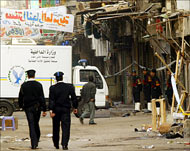Cairo attack suspects go on trial
Fourteen people have gone on trial over three terrorist attacks in Cairo which killed two French tourists and an American.

The 14 defendants, including two women, all pleaded innocent to charges on Saturday that included collaborating in the April 2005 attacks, the unlicensed possession of weapons, ammunition and explosives, harbouring fugitives, and belonging to a banned group.
In the first of the three attacks, on the edge of the Khan el-Khalili bazaar, the bomber and the three foreigners died and 18 people were wounded.
In the second, three weeks later, only the bomber died when he jumped from a bridge behind the Egyptian Museum in central Cairo, landing near a tourist bus. Nine people were wounded, four of them foreigners.
A few hours later, two women opened fire on a tourist bus near the Cairo Citadel. There were no casualties in the attack but one of the pair shot dead her accomplice before turning the gun on herself and later died in a hospital.
Caged dock
The defendants appeared in a caged dock at the Cairo emergency security court. Five other people implicated in the attacks are dead. Four died carrying them out, and the other in police custody.
The prosecutor told the court that the defendants had confessed during interrogation to buying the explosive materials and making the bombs used in the attacks.
 |
|
Foreign tourists were targeted in |
A member of the defence team said that the detainees were tortured in prison, and were denied visits by their family members for more than a year.
Gamal Ahmed Abdel-Al, a 25-year-old male defendant, after asking permission to address the court, said that he and the others were tortured for refusing to confess to “crimes we haven’t committed”.
One of the female defendants, Seham Qammar Zaman, a 47-year-old woman, screamed hysterically in the dock before collapsing.
Mukhtar Nouh, a member of the defence team, said the interior ministry had framed the defendants because it could not identify the real culprits and wanted to improve its image with the public.
After the charges were read and the pleas given, the trial was adjourned until October 21.
At the time of the attacks, police said they were the work of a small group of religious extremists based in the Nile valley.